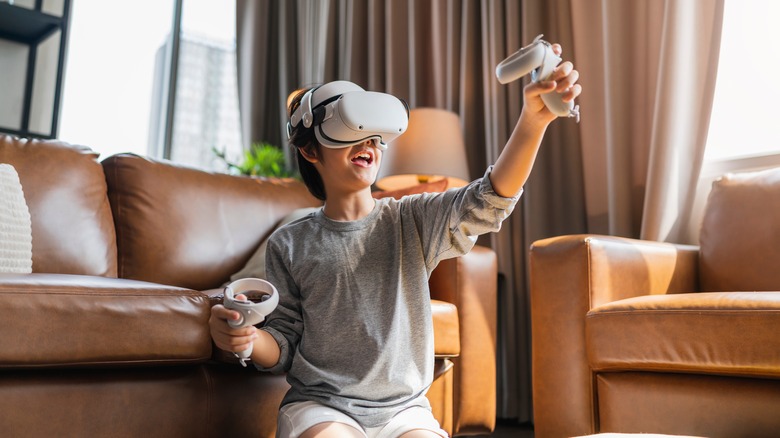In today’s digital age, kids find it hard to imagine life without the internet. We ourselves use it to connect with friends and family, stay up-to-date on news and events, and even work remotely. Our children do the same. From completing school work to social media scrolling, their screen time can easily consume their precious time, leaving them feeling disconnected from the real world.
Willough Jenkins, MD, is the Medical Director of Emergency and Consultation Psychiatry at Rady Children’s Hospital-San Diego and Assistant Professor of Psychiatry at the University of California San Diego. As a Canadian and American board-certified psychiatrist specializing in child psychiatry, Jenkins’ clinical work is focused on the area of pediatric consultation liaison psychiatry, which is treating psychiatric illness in medically ill children. She tells Health Digest exclusively that spending too much time online can take away from key aspects of a child’s development.
“With hours spent online, children are not spending time with family, with friends, or in athletic and creative activities that we now know are important for their development,” Jenkins says. “Too much time on social media, especially if they are already struggling with mental health or body image, can be problematic.”
Jenkins adds that chat features in online games can expose them to cyberbullying and predatory behaviors. Although it’s impossible to keep children from the internet, Jenkins gives us insight into how we can help our children manage their time better online.
How much time online is too much?

Dr. Jenkins suggests first taking a look at how much time your child is spending online and what they’re doing. After all, spending time online doing schoolwork will have different effects than if your child is playing video games or scrolling through social media feeds. She believes more than two hours online is too much.
Dr. Jenkins also advises parents to look at a child’s resistance to being away from the internet. “Children who resist getting off screens, sacrifice meals, sleep, and social interaction to spend time online, are certainly exhibiting signs that the amount is excessive,” she says. While some children might find it easy to put down their phones or log off their computers, others will find it more difficult.
“Unfortunately, children who are already struggling with mental health or behavioral issues may have the most difficulty managing their time online,” Jenkins says. “Irritability, a sole focus on online activities to the detriment of other activities, and disrupted sleep patterns can all be indicators of excessive screen time.”
Finding the right balance between educational and excessive
The internet has a wealth of information for children to learn something new, and can be a key way for some children — for instance, those who live in rural communities — to find connections and support. On the other hand, some online behaviors can negatively impact a child’s mental health. Jenkins says it’s important to consider the right balance of online activities to develop a healthy and responsible relationship with the internet.
“We can achieve this by promoting positive online activities, such as educational apps and connecting with groups involved in charitable endeavors,” Jenkins says. “If our children are using social media, we can provide some guidance and encourage them to follow positive role models.” She recommends keeping an open dialogue about some of the dangers of being online and what your child is doing while engaging with the screen.
Balance also includes when to turn off the screens. Jenkins suggests setting a rule of turning off phones an hour before bed so your child can get enough sleep each night.
What to do if your child is spending too much time online
Yuganov Konstantin/Shutterstock
Although it might be difficult to pry your child away from the phone or the online video game, Jenkins advocates using parental controls or monitoring software. That way you can track their online activity and limit access to content that you find inappropriate. She also advises taking breaks from the screen throughout the day to reduce eye strain and fatigue. These breaks could include activities outdoors or some physical exercise.
You can also encourage children to take ownership of their relationship with their digital devices by giving them tools to help them handle the digital world more safely. You can help them get more involved with extracurricular activities to not only limit their screen time but also help in their childhood development. “It is equally important to involve children in regular family activities, such as cooking together, taking family walks, or pursuing shared interests,” Jenkins says.
Your child will often be guided by your behaviors as well. “It is important for parents to lead by example and model good screen-time habits by avoiding excessive use of electronic devices during family time and participating in offline activities,” she says.